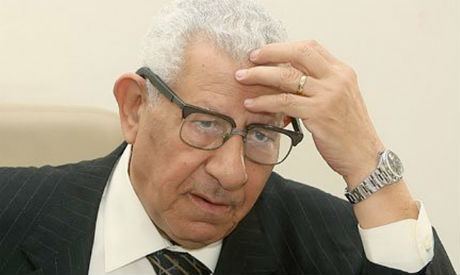
File Photo: Head of Egypt's Supreme Council for Media Regulation Makram Mohamed Ahmed (Photo: Al-Ahram)
Egypt’s Supreme Council for Media Regulation has defended its decision to issue a media gag order on reports of misconduct by the 57357 Children's Cancer Hospital, just hours after the council's head Makram Mohammed Ahmed was summoned by the prosecutor-general for issuing the gag order.
In an official statement on Saturday evening, the council said that Ahmed will adhere to the summons out of "respect for the state’s institutions," and argued that the gag order was "legally correct" and served the national interest by protecting a "giant medical facility."
“We assert that the decision to suspend publishing was made according to work undertaken by the vetting committee formed by the solidarity minister, which is an administrative committee that does not have judicial authority,” Ahmed said in a statement in response to Prosecutor-General Nabil Sadek’s summons.
Earlier on Saturday, Sadek summoned Ahmed to investigate his decision to implement a media gag on reports related to the prominent 57375 Children's Cancer Hospital, asserting that the Supreme Media Council has no authority to order media gags.
The prosecutor-general also issued a media gag order on the ongoing investigations with Ahmed following this statement on Saturday.
"Referring to what media and newspapers reported concerning the decision by the Supreme Media Council to impose a gag order on a case related to a major international medical institution, this decision is ineffective and violates the law," a press release issued by the prosecutor-general's office said.
The statement said that the decision is an imposition on the jurisdiction of the judicial and executive authority entrusted with protecting the public affairs of the state.
The prosecutor-general addressed the head of the Supreme Media Council, saying "the law of your council has the right to protect the freedom of the press and the citizen's right to enjoy free press within a professional framework, otherwise you have no jurisdiction in accordance with the constitution and the law; the provisions of the law must be interpreted in the correct manner.”
Last month, the Egyptian government formed a committee to investigate complaints about the operation and spending of the hospital.
The move came two weeks after prominent screenwriter and columnist Wahid Hamed wrote an article questioning the well-known cancer hospital's spending of millions of Egyptian pounds worth of donations.
He also criticised the organisation’s big-budget advertising campaigns and what he described as the extravagant salaries of the management, which he claimed is dominated by one family.
The investigating committee, which consists of members of Egypt’s Central Auditing Authority and the Administrative Control Authority, will take 10 days to conclude its investigation, Solidarity Minister Ghada Wali said.
The hospital, which is named after its donations hotline, was founded in 2007 and relies entirely on donations to treat child cancer patients, organise advertising campaigns and pay the salaries of its staff.
The hospital has slammed the allegations against it as “inaccurate information” and said in a statement that it had prepared a report with detailed lists of donation expenditures and sent it to authorities.
Formed in 2016 upon a decree by President Abdel-Fattah El-Sisi, the SCMR identifies itself as an authority authorised with "protecting rights, opinion, and expression, as well as ensuring the independence of the media in accordance with the constitution and the law."
According to the council’s website, the council grants licences for print and visual media and sets criteria for the assessment of the media's performance.
The council says it is mandated with receiving and reviewing complaints about content published in newspapers and media outlets that could be defamatory, and implementing the appropriate disciplinary measures against media outlets that violate the code of conduct.
The council also says that it has the right to give its opinion on draft laws prepared by parliament on the press and the media in Egypt.
Over the past few weeks, Egypt’s journalism scene has witnessed controversy over a new press law that some argue was passed without sufficiently consulting press bodies. Some have also criticised the law for granting more authority to state-formed media regulatory bodies.
Ahmed praised the new law last week, while the country’s National Press Authority has said that the 55-article draft press law is compatible with the constitution.
Short link: